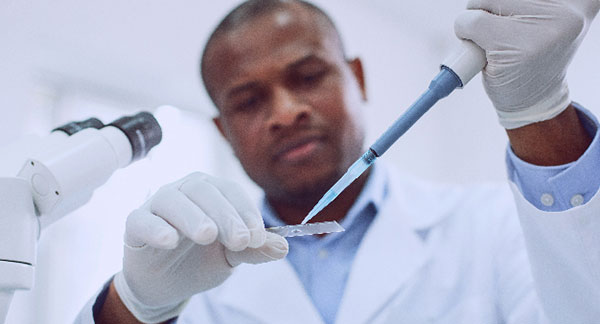The Future of OA Therapies
Experts focus on the challenges and promise of cell-based therapies to treat osteoarthritis.
By Jill Tyrer | Nov. 19, 2021
When you’ve done everything your doctor suggests to ease your joint pain and nothing seems to help enough, the promise of an injection that might ease pain, let you resume activities you love, delay surgery — and maybe even repair your damaged joint — sounds very appealing. So it’s understandable why so many clinics have popped up offering so-called “stem cell” therapies that promise to relieve arthritis and a range of other diseases.
However, there are no stem cell therapies approved to be sold legally in the U.S. for joint diseases because none have proven safe and effective for arthritis and related problems.
But that doesn’t mean researchers don’t see promise in such cellular-based, biological therapies, or regenerative medicine, for orthopedic conditions.
A recent Osteoarthritis Clinical Studies (OACS) Forum, titled “Cellular Therapies in OA,” brought together thought leaders in the field to discuss research challenges of these kinds of biological therapies, the role of rules and regulations, plus potential pathways forward and how the Arthritis Foundation might facilitate that process. Leading international experts, including investigators, clinicians and industry and regulatory experts took part in the November forum.
“Cellular Therapies” Today
The Food and Drug Administration (FDA) — which is charged with vetting drugs and medical treatments for safety and for effectiveness — has approved certain types of cellular-based therapies to treat cancers and a few other conditions. And some do have promise for orthopedic conditions, but the marketing has gotten ahead of the science, especially for osteoarthritis (OA).
One of the challenges is defining exactly what they are, because there is vast variation in what cells are harvested, how they’re harvested, the patients they’re harvested from, and how they’re processed. And the presence and potency of actual stem cells — which can develop into other types of cells, such as bone or blood cells — is not uniform. They might be derived from the patient’s own blood, bone marrow, skin or fat, for example. Often, the stem cells are present in such minute quantities that it’s not clear that they are the active ingredient, says forum moderator and orthopedic surgeon George Muschler, MD, professor of orthopedic Surgery and Biomedical Engineering and director of the Regenerative Biology Laboratory at Cleveland Clinic.
“Stem cells [sound] hot and sexy and have a tremendous appeal in the patient population. They come in and ask for stem cell therapy,” says Scott Bruder, MD, PhD, a pharmaceutical consultant, adjunct professor of orthopedic surgery and biomedical engineering at Case Western Reserve University and former member of the FDA Advisory Panel on Cell, Tissue and Gene Therapy. However, he adds, “It is a slippery slope and a dangerous position for clinicians and institutes to be advocating and promoting stem cell therapy, because there are no stem cell-approved products in orthopedics.”
Scientists are working with different formulations of biological therapies, such as bone-marrow aspirate concentrate (BMAC), induced pluripotent stem cells (IPSC) and platelet-rich plasma (PRP). Some of these do actually seem to relieve joint symptoms according to early reports, but none have been proven to repair joints, which is what patients often expect.
“I try to make a distinction between symptom modification and structure modification. That is, many of these therapies can treat symptoms to varying degrees but we do not have much data to support they’re truly structure-modifying, that is, that they can regenerate tissue,” says Scott Rodeo, MD, orthopedic surgeon and director of the Center for Regenerative Medicine at Hospital for Special Surgery, professor of orthopedic surgery at Weill Cornell Medical College and head team physician for the New York Giants Football.
But OA has few effective treatments, and after someone has followed the recommended therapies — losing excess weight, staying physically active and taking medications available to treat OA pain — there aren’t many other options short of joint replacement. One of these unproven biologic therapies might help fill that treatment gap as long as no evidence-backed alternative exists, says Nicolas Piuzzi, MD, orthopedic surgeon and director of Adult Joint Reconstructive Surgery Research at Cleveland Clinic.
It’s important to manage expectations, though, Dr. Rodeo adds. Insurance typically does not cover these unproven treatments. “I try to explain to the patient that there is a cost outlay. And there is variability in outcome — the degree and duration of relief can be variable. You want the patient to maintain hope but also have realistic expectations.”
Research Challenges
Much more research is needed for these kinds of biological treatments. “It’s clear there is something there because people do seem to get better,” says Dr. Muschler. But numerous variables complicate research and add to the potentially enormous cost of trials to produce a usable product. “There’s huge variation from patient to patient and even from time to time when we make those [biological] preparations,” he says. “What type of patient, what type of comorbidities, what type of disease and how do we manage that variation in lot-to-lot preparation, much less the execution — delivering it to the right place and other factors that influence outcome.”
And how do you measure the cost-benefit in terms of risk as well as financial cost?
“I feel like I would do a disservice to a patient unless I could offer at least a 50% reduction in pain for at least six months and delay their need for surgery a year or longer,” Dr. Muschler says, “because I recognize that the arthroplasty option for OA is a pretty good one, [with a] 95% chance of having an excellent pain result, [and the] average survival of knees now is 30 years. So the idea of providing a therapy that denies them the opportunity to go down that path of predictability, unless it offers them something substantial and predictable, is a challenge.”
And even if regenerative medicines regrow tissue, like cartilage, that doesn’t necessarily mean the patient will experience any improvement in symptoms, Dr. Rodeo says. In fact, there is typically a disconnect between pain a patient feels and the joint damage that imaging, like an X-ray, shows. Plus, the FDA wants to see “real-world” benefits, like improvements in pain and function, before it will consider approving a product, Dr. Bruder adds.
“As we consider this, we won’t know if we are relieving suffering and improving lives unless we collect data before and after, in which patient and over what period of time. So it’s truly necessary to be collecting data to make sure we’re being effective,” Dr. Muschler says.
Randomized control trials, the gold standard in research, would be difficult and costly, but prospective control trials could help shed light on some of the key answers. And registries (databases of patient information) and biorepositories (collections of specimens) can feed research.
Also critical to research: standardized definitions and measures. “What are the markers of quality, purity, potency, whatever it is — which will be different for different tissues? A one-size-fits-all approach doesn’t make sense,” says Dr. Rodeo. “We need much more of a precision-medicine approach, where we can match a tailored therapy to the patient. … We need to define the phenotype of the patient we’re treating, what we put in the patient, what are the patient characteristics and how do we match the two.”
Another complication: Scientists still don’t understand exactly how osteoarthritis happens on a cellular level, so they don’t know exactly what to target as a way to disrupt or slow the disease process, Dr. Piuzzi says.
Future Promise
While there’s a long way to go to having an FDA-approved cell-based biological therapy to treat OA, scientists recognize their promise and continue to lay the groundwork for further, more targeted research.
The Arthritis Foundation can help, forum participants agreed, by continuing to bring together different stakeholders to discuss the challenges and opportunities and to build consensus.
“Bringing people together from different backgrounds is great first step,” says Dr. Piuzzi. It has a unique position in being able to bring patients’ perspective to the table and to deliver data and information that’s important to patients and doctors — such as dispelling common misunderstandings about “stem cell” therapies and other biological treatments for OA.
Scientific Professional Sign Up
Stay up-to-date on the latest science funding opportunities, volunteer opportunities and other research collaborations.


